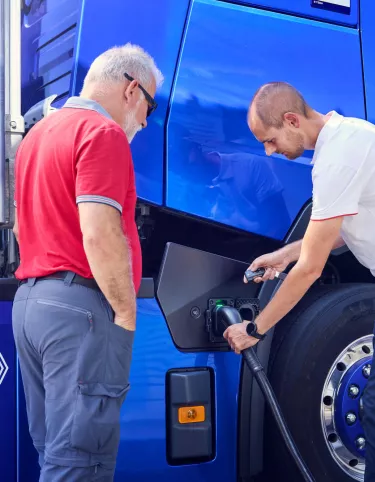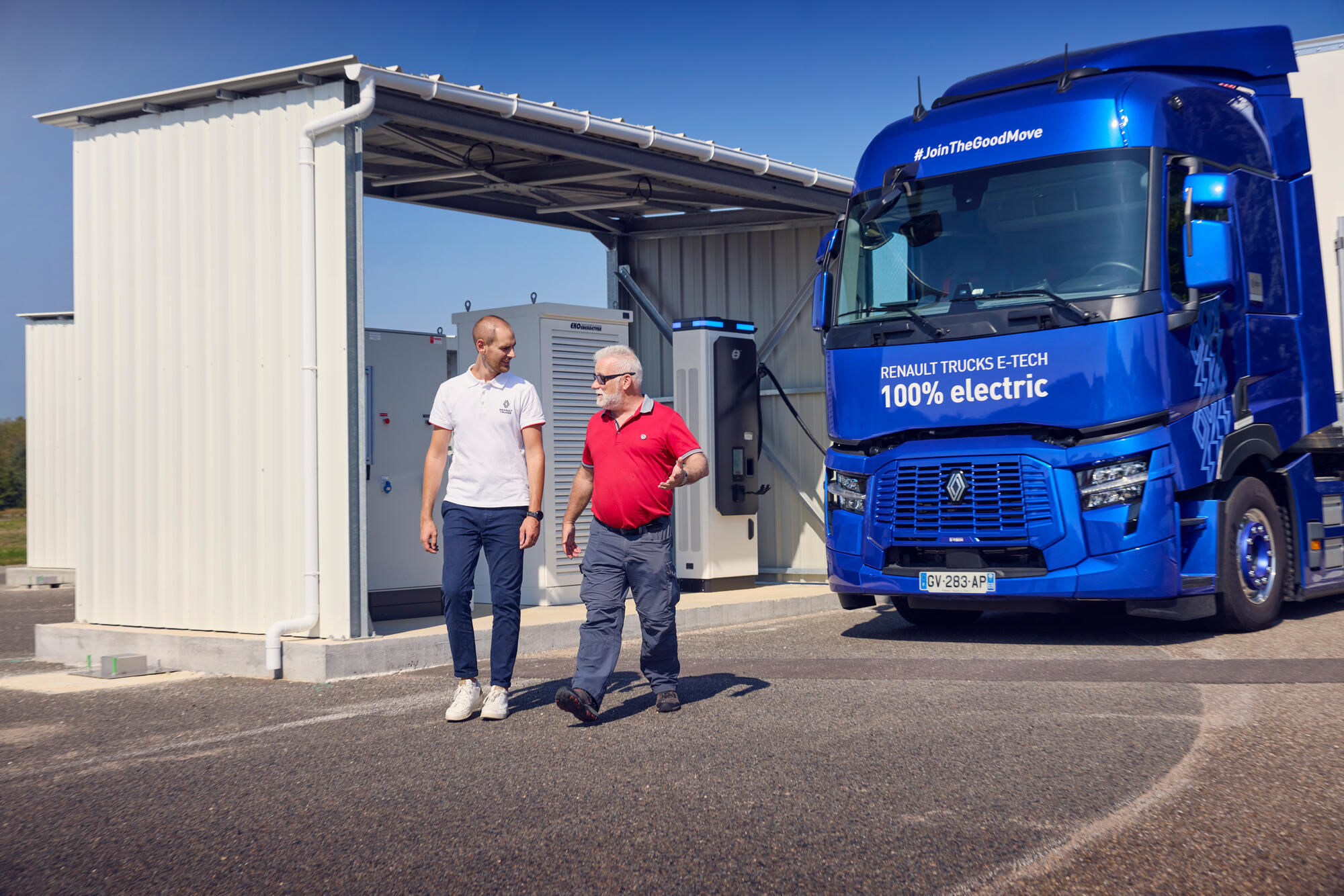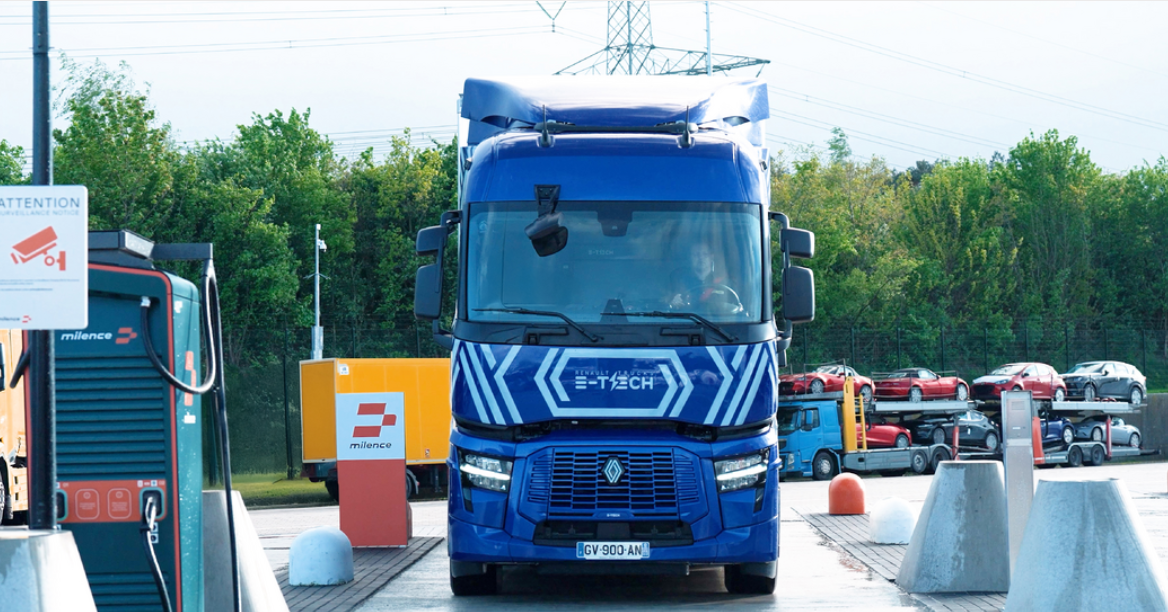Welcome to Renault Trucks UK
Transport solution
Installation and maintenance of charging stations for your electric trucks
Electromobility
Apr. 10 2025

With the deployment of electric trucks, transport and logistics companies face the challenge of designing, acquiring and installing the necessary charging infrastructure. As the number of electric trucks operating from the same logistics terminal or depot increases, so does the scale of the charging infrastructure.
Defining your charging infrastructure project based on your operational needs
As part of your decarbonisation journey, it’s important to conduct a site infrastructure and vehicle route analysis. An adapted, optimised, and well-maintained infrastructure results in the enhanced performance of your electric trucks and improved return on investment. This will be a key element in the profitability of your fleet.
-
Which types of electric vehicle are compatible with your operations?
-
What are the constraints of your operation?
-
What are your specific charging requirements?
-
Which type of charging is best suited to your operation?
After analysing your daily operations, we determine the required charging power. Renault Trucks’ E-Tech experts can audit your site’s power capacity and layout to assess the impact of the charging infrastructure. Lastly, we determine whether a power upgrade is needed and provide a roadmap for its implementation. Our experts team benefit from strong experience in electrical systems and specific tools, so they can help you achieve this mission.

Implementation processes should start as soon as possible to allow for equipment acquisition, site modification works, or grid upgrades.
Offering solutions to suit your business needs
Depending on the answers to these questions, we will provide you with recommended charging systems best suited to you and your business. Depending on your operation, an overnight charging system may be sufficient. In other cases, it will be key to make provision for a fast-charging system. It is also an option to use a mobile fast-charge station - this may be positioned temporarily in one or more strategic locations, for example.
The charging solutions that we advocate are systematically tested and signed off by our technical departments. They are used in conjunction with specific online software that enables optimised charging, which ensures that you can distribute your electrical energy consumption to be as cost-effective as possible. You will also be able to monitor all stages of charging, and schedule it for the most convenient times. This is known as smart charging.
To guide you in your final choice, our experts suggest several charging layouts drawn up according to your constraints and the priorities associated with your operational requirements. The objective is to limit your vehicle’s downtime and optimise your return on investment.
Renault Trucks support
At Renault Trucks, we support our customers in the implementation of their charging infrastructure. That’s why we offer a comprehensive portfolio of charging solutions.
This portfolio is adapted to all customers, whether it is your first electromobility experience or not.
We test and classify chargers as:
-
Tested Solutions: Tested with our vehicle in real-world use cases. It gives a likelihood of compatibility that may change over time with software updates and product evolutions.
-
Preferred Solutions: backed by technical agreements, securing compatibility, updates, and top performance over time.
For a seamless experience, choose chargers from our preferred list, which is updated regularly.

Renault trucks strongly believes that a truck and a charger cannot be dissociated and should be considered as one single system. This approach is key to secure the best uptime. Our knowledge and experience on that matter will help you have the best experience.
Our European partners excel in project design, execution, and maintenance, including site audits, subsidy assistance, and managing advanced technologies like solar energy and battery storage. They ensure rapid response times, remote support, and validated hardware for optimal uptime. Turnkey partners are trained on electric trucks, offering tailored designs, financing, and leasing options to meet your charging infrastructure needs.
Through Renault Trucks and its infrastructure partners across Europe, you will get access to dedicated staff and services to maintain your charging infrastructures:
-
Professional services including 24/7 hotline, remote actions, on-site interventions with trained technicians.
-
Preventive maintenance with an annual visit to secure charging infrastructure lifetime and performance.
-
Corrective maintenance to ensure site repair and spare parts, together with short intervention time for the best uptime.
Our certified and experienced Renault Trucks E-Tech network is always here to help.
Public charging stations for long haul transport
The number of charging stations will increase over the coming years in Europe.
The European commission has put a large emphasis on charging infrastructure as a prerequisit to achieve electrification targets. The European Commission’s Alternative Fuels Infrastructure Regulation (AFIR) calls for a minimum of charging locations for trucks along the most important European highways (TEN-T network). The current directive stipulates that charging stations with at least one charging station of at least 350 kW should be available every 60 km on core routes and 120 km on extended networks by 2030.
Milence is a company dedicated to building and managing public charging solutions for battery-electric trucks and coaches in Europe. Established in July 2022 as a joint venture between Daimler Truck, the TRATON GROUP, and the Volvo Group, Milence aims to accelerate the transition to zero-emission heavy-duty vehicles. Renault Trucks, through the Volvo Group’s deals with Daimler Truck and the TRATON Group, commits to providing a performing charging network to its clients all across Europe. Their ambitious goal is to establish 1,700 high-capacity public charging points across Europe by 2027. These charging hubs are designed to be fast, reliable, and accessible, with some of the highest power outputs available today, up to 400 kW CCS chargers. They also plan to implement megawatt charging capabilities soon, which would allow long-haul trucks to be fully charged in just 30-45 minutes.

It also should be noted that the power of charging stations will increase little by little, making the appearance of megachargers possible. These will make it possible to partially or fully charge a truck in just minutes.
Public charging stations
Though the vast majority of charging will happen at depots, a sufficient and effective charging infrastructure is the foundation for electrifying heavy-duty transportation.
Manufacturers, in partnership with energy providers, are striving to establish a robust network to support the increasing number of electric vehicles. Various charging station networks are being developed, enabling long-distance travel across Europe, thanks to high-power chargers that recharge vehicles during drivers' mandatory breaks. Soon, this process will become even more efficient with the arrival of megachargers, which can partially or fully recharge trucks in a few minutes.
The charging network in Europe as of 12/12/2024:
- 104 operational charging stations dedicated to trucks;
- 114 operational stations compatible with trucks;
- 117 planned stations for trucks
To help customers in their electrification journey, Renault Trucks references most of the existing and future public charging infrastructure for trucks. Thus, with the assistance of our electromobility experts, you can plan your electric routes including charging at public stations thanks to our Range Simulator.
Below is a map of the truck-dedicated charging infrastructure in our database:
This map is and remains the exclusive property of Renault Trucks and is based on publicly available, aggregated data from energy suppliers. The list is not exhaustive. Renault Trucks makes no warranty or representation regarding this list and therefore assumes no responsibility for errors resulting from inaccurate information provided by these external sources, as updates and modifications depend on their data. Users are advised to verify the availability and working condition of chargers before use on the supplier website.
Frequently asked questions on electric truck charging
The market for electromobility and charging equipment is growing rapidly both in volume and number of suppliers. Electric vehicle supply equipment (EVSE) technology, both hardware and software, is developing very fast. When intending on procuring charging equipment for a Renault Trucks E-Tech vehicle, always consult your Renault Trucks E-Tech sales representative in advance.
Renault Trucks classifies charging hardware in two categories:
-
Tested charging solutions: test including commercial vehicle use cases (e.g. re-initiate charging or delay charging). The interoperability testing shows how likely a charger model is to work with our vehicles. However, tests are done at a specific time with the current hardware and software, which may change. This means that a charger model that has worked before may not work later.
-
Preferred chargers: charger suppliers with technical, connectivity and collaboration agreement. Thus, we can secure that the chargers are compatible with our E-Tech trucks over time, including future updates.
The list of preferred chargers is available here.
The purpose of selecting compatible charger suppliers is to enable dealerships to recommend and/or sell chargers suitable for Renault Trucks E-Tech vehicles. Thus, we can ensure that the chargers are compatible with our vehicles.
This interoperability collaboration includes a specific way of working to maintain interoperability and services over time:
-
Testing and development: preferred charger suppliers develop their chargers for full compatibility with Renault Trucks’ vehicles and services, and their chargers are permanently installed at our R&D facilities for continuous testing.
-
Customer support: address issues in a common structured contact, troubleshooting and repair system to improve uptime.
If a mobile phone charger fits your phone, it can likely charge it. Unfortunately, this is not the case for electric vehicle (EV) charging. Even if the charging connector fits the vehicle, not all chargers can charge the vehicle, and some chargers can charge the vehicle but with limited functionality.
There are multiple reasons for this, one is the DC voltage level required that is typically higher on heavy duty EVs, than for passenger cars. Other reasons are related to authorisation, payment setup, or just the fact that many chargers are developed for passenger EVs and not supporting heavy duty EV use-cases.
Basic interoperability testing is carried out by experienced test engineers at our test facilities in Gothenburg (Sweden) or Lyon (France), at trade fairs or in real conditions. Currently, our primary focus is on CCS DC chargers for the European market. However, some Type 2 AC chargers have been tested, even if the likelihood of incompatibility is low. We have tested so far more than 100 models of charger.
The testing includes if charging starts as expected and reaches the expected power level, behaviour when charging is stopped in various ways, if “Wake-Up” functionality is implemented (130+ models). If possible, we also test how/if sequential charging works and what happens if there is a temporary power cut.
A charger being tested OK, means that: that specific model proved interoperable with Renault Trucks electric vehicles when the test was done. Software updates and other product adaptations may alter the interoperability. To provide more guarantee of interoperability over time, Renault Trucks works with preferred charger suppliers with whom we have interoperability collaboration.
Electric vehicles continuously consume energy, even when stationary, keeping the batteries and the cab at the desired temperature. The Wake-up feature ensures that your vehicle is always fully charged and ready to run after a period of inactivity.
Wake-Up is also referred to as BCB-toggle in charging standards like IEC 16851 and ISO 15118. The feature allows electric vehicles to reinitiate charging if staying connected to the charger after a completed session. This ability is crucial for maintaining the vehicle's state of charge (SOC) when parked and connected to a charger overnight or over the weekend/holidays.
Most AC-chargers support this use case. Many DC chargers do not, especially if they are primarily designed for public fast charging and/or charging electric passenger cars. Such chargers are ideal for quick en-route charging but not suitable for charging over an extended period. Note that even if a certain charger has been tested OK for Wake-Up, the function may be blocked on a public charger.
Renault Trucks is able to offer holistic support – from selecting and monitoring electric vehicles to defining appropriate infrastructures, we can support your commitment to decarbonising your fleet while maintaining your margins and profit levels.
